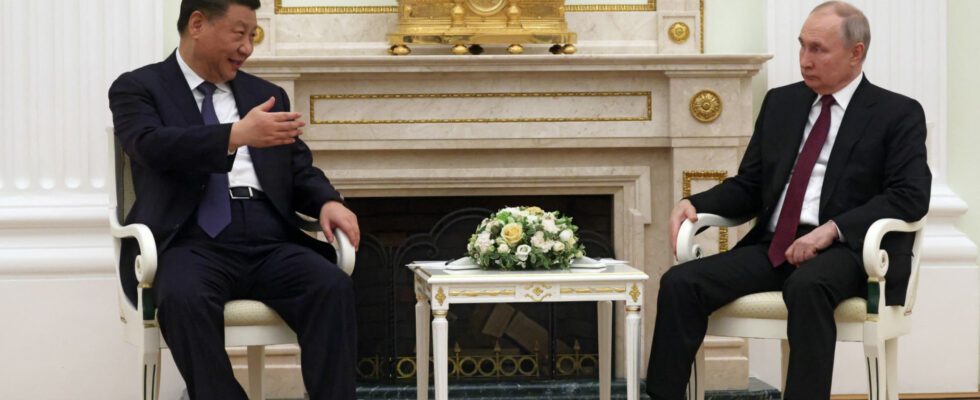Vladimir Putin said he was “open” to discussions on the Chinese peace plan for Ukraine on Monday with Xi Jinping, who in return praised the “close relations” between Russia and China, at the start of a meeting eagerly awaited in Moscow. The three-day state visit to Russia started Monday by the Chinese president comes a little more than a year after the outbreak of the Russian offensive against Ukraine, which caused geopolitical and economic upheavals.
Beijing, mediator to settle the conflict
Despite its privileged relations with Moscow in full tension with the West, Beijing, which claims diplomatic influence to match the weight of the Chinese economy, poses as a mediator and last month proposed an initiative to settle the conflict. “We are always open to a process of negotiations. We will undoubtedly discuss all these issues, including your initiatives, which we treat with respect,” Vladimir Putin said at the start of an “informal” meeting with Xi Jinping. in the Kremlin, broadcast on Russian television.
For his part, the Chinese president praised the “close relations” between Beijing and Moscow, which have “comprehensive strategic cooperation”, according to the official Russian translation of his remarks. For Vladimir Putin, Xi Jinping’s visit in the form of support is all the more important as he is increasingly isolated in the West and targeted since last week by an arrest warrant from the International Criminal Court for “crimes of war”. The Kremlin said their “informal” tete-a-tete would be followed by dinner, before more formal talks on Tuesday, with the expected signing of agreements to deepen Russian-Chinese cooperation.
“Journey of Peace”
If China, strong from its role in the recent reconciliation between Saudi Arabia and Iran, puts forward its plan for Ukraine, it has difficulty convincing Western countries. London nevertheless said on Monday “hope” that Xi Jinping would urge Vladimir Putin to “put an end to the atrocities” in Ukraine. The United States accuses China of considering supplying arms to Russia, which Beijing firmly denies. kyiv, which politely welcomed the Chinese peace plan, urged the Chinese president on Monday to “use his influence on Moscow to end the war of aggression”.
According to the American daily The Wall Street Journal, Xi Jinping may have a telephone conversation with Ukrainian President Volodymyr Zelensky once he returns to China. As if to signify its support for Kiev in the face of Beijing’s support for Moscow, the European Union announced on Monday that it had released two billion euros to buy and deliver artillery ammunition to Ukraine. But this summit also aims to display the understanding between Russia and China, at a time when these two countries are experiencing strong tensions with the West, even if Moscow seems more dependent on Beijing than the reverse.
In an article published in a Russian newspaper, Xi Jinping presented his trip as a “journey of friendship, cooperation and peace”. “We have a lot of common tasks and goals,” Vladimir Putin told the Chinese president on Monday. In an article published in a Chinese daily, the Russian head of state considered that Russian-Chinese relations had “reached the highest point in their history”.
Economic dependency
Isolated in Europe and now under an arrest warrant from the ICC, Vladimir Putin can once again count on Beijing’s support. Chinese diplomacy thus called on Monday the ICC, whose headquarters are in The Hague, in the Netherlands, to avoid any “politicization” and to respect the immunity of heads of state. Moscow, for its part, reacted by announcing Monday a criminal investigation against several magistrates of the ICC. As a sign of defiance, the Russian president went this weekend to Mariupol, a Ukrainian city devastated by Russian bombing.
Beyond diplomatic support for Russia, which has massively reoriented its economy towards China in the face of Western sanctions linked to the conflict in Ukraine, Xi Jinping’s visit is also of economic importance. Russia has notably increased its hydrocarbon exports to Asian giants, such as China, to compensate for European embargoes. This makes it increasingly dependent on Beijing, according to analysts. According to the Kremlin, the two presidents will sign several documents, including on Russian-Chinese economic cooperation by 2030.
